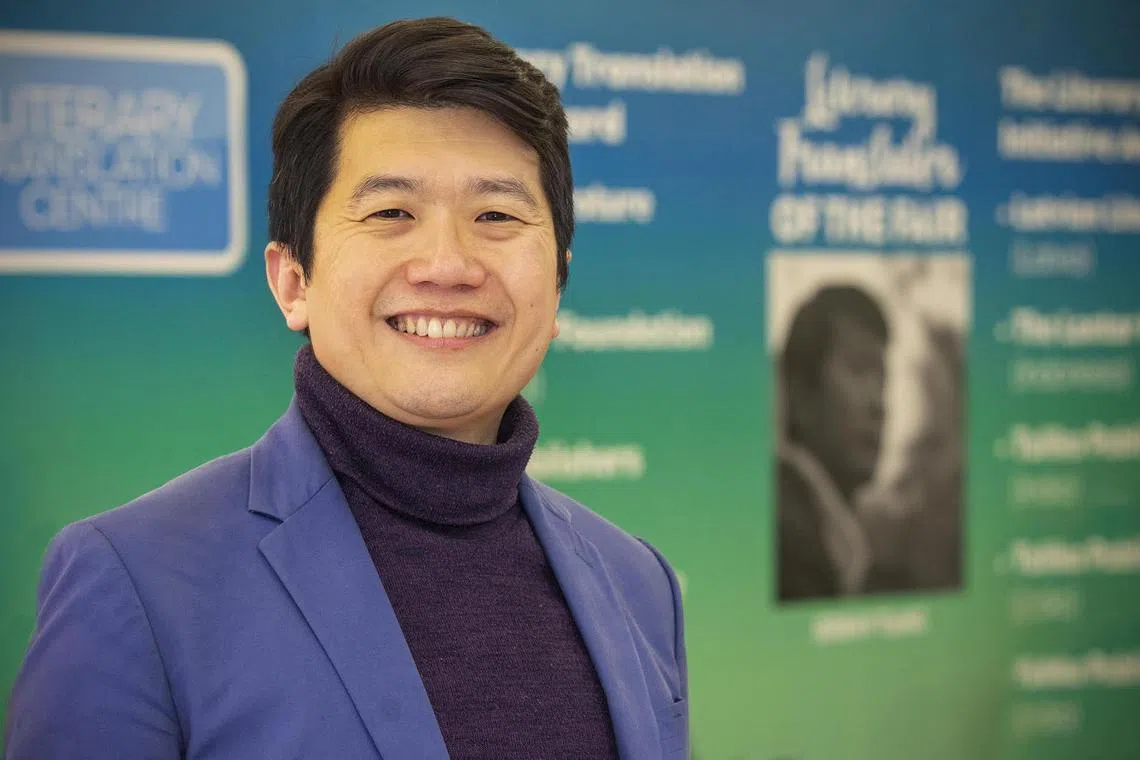Jeremy Tiang is first Singaporean to make International Booker Prize longlist with Ninth Building
Sign up now: Get ST's newsletters delivered to your inbox

Jeremy Tiang is one of Singapore’s most prolific Chinese-to-English translators.
PHOTO: EDWARD HILL
Follow topic:
SINGAPORE – Author of State Of Emergency (2017) and translator of 28 books Jeremy Tiang has become the first Singaporean to make the International Booker Prize longlist.
The 46-year-old’s translation of Chinese author and playwright Zou Jingzhi’s Ninth Building was among the 13 books picked by judges on Tuesday, which came from 12 countries and included first nominations for books originally in Bulgarian, Catalan and Tamil.
A collection of vignettes in the “doculiterary” genre, Ninth Building follows a teenager caught up in the passions of Mao Zedong’s drive for ideological purity in the 1960s and 1970s, and is based on Zou’s life in China during the Cultural Revolution.
It is part of a diverse cast of works recognised this year by a panel of judges chaired by French-Moroccan novelist Leila Silmani and including Malaysian novelist Tan Twan Eng; Parul Sehgal, staff writer and critic at The New Yorker; Frederick Studemann, literary editor of the Financial Times; and Uilleam Blacker, one of Britain’s leading literary translators of Ukrainian.
Tiang, of Sri Lankan-Tamil and Malaysian Chinese heritage, won the Singapore Literature Prize in 2018 for his English-language novel State Of Emergency, and has translated novels by Cultural Medallion recipient Yeng Pway Ngon and Chinese author Yan Geling.
He also translated the 2015 autobiography Never Grow Up by film star Jackie Chan.
Tiang said: “I was surprised and delighted at the news. Since 2016, when the International Booker Prize shifted to focus on books in translation, it has succeeded in bringing recognition to many voices that would otherwise not have received as much attention.
“The decision to jointly honour the author and translator has thrown a welcome spotlight on the art of translation,” says the full-time writer and translator who read English at the University of Oxford and then trained as an actor at Drama Centre London.
Tiang had in 2022 become the first Singaporean to be invited to judge the International Booker Prize.
He grew up in an English-speaking household, but developed an interest in Chinese literature in his 20s, when he first submitted his translation of Quah Sy Ren and Tan Ing How’s play The Assassin, The Medium And The Massage Girl to a translation competition by London’s Gate Theatre.
He said he first encountered Zou’s book in 2012, and knew as soon as he read it that he wanted to translate it, submitting the stories to literary journals and publishers over the next decade.
Ninth Building was eventually picked up by Honford Star in the United Kingdom and by Open Letter Books in the United States.
“Zou’s voice is so distinctive. And although I knew the history of the Cultural Revolution, I’d never seen the perspective he brings to it,” Tiang said.
“I seek out a wide range of work from across the Sinophone world, though of course I have a soft spot for Singapore and Malaysia. I move between languages and cultures in my own writing, so in a way, translation comes naturally to me. It’s an area I feel very comfortable in.”
The International Booker Prize is given annually to the author and translator of a work of fiction which has been translated into English and published in the UK and Ireland, and comes with £50,000 (S$82,000) in prize money for the winning author-translator team.
All shortlisted authors and translators will also each receive £2,500. The shortlist of six books is set to be announced on April 18. The winning title will be revealed in London on May 23.
Other translated works on the longlist include Whale by Cheon Myeong-kwan, translated by Chi-Young Kim, which has elements of Korean fairy tales; French horror in The Birthday Party by Laurent Mauvignier, translated by Daniel Levin Becker; Caribbean gospel in The Gospel According To The New World by Maryse Conde, translated by Richard Philcox; and Indian melodrama in Pyre by Perumal Murugan, translated by Aniruddhan Vasudevan.
The Booker Prize team said the writers and translators selected range from a film director to two former security guards, as well as a writer, Perumal, who had declared himself “dead”.
In 2015, Perumal announced his retirement after his book, Maadhorubaagan (2010) – about an Indian couple trying for a baby – prompted protests, litigation and the burning of his book by Hindu caste-based groups.
French is the most-represented language on the list – with three works – although the three authors longlisted were variously born in Guadeloupe, France and Cote d’Ivoire.
Tiang, who in 2022 told The Straits Times that he thinks everyone should try translating, said there continues to be a need to change the mindset that translation is of lesser importance.
The New York-based writer-translator – who also has a master’s in theatre – reaches for the analogy of performance.
“Being a translator is like being an actor, in that you aren’t the originator of the work, but you are responsible for artistically interpreting it, and the resulting performance is a creative collaboration between the playwright and the actor,” he said.
“In a similar vein, Zou wrote the original book, and I wrote the English version. The translation is the meeting point of both our artistic processes.”


